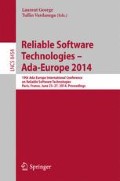Abstract
Requirements validation is an essential activity to carry out in the system development life cycle, and it confirms the completeness and consistency of requirements through various levels. Model-based formal methods can provide a cost-effective solution to requirements validation in a wide range of domains such as safety-critical applications. In this paper, we extend a formal language Timed Abstract State Machine (TASM) with two newly defined constructs Event and Observer, and propose a novel requirements validation approach based on the extended TASM. Specifically, our approach can: 1) model both functional and non-functional (e.g. timing and resource consumption) requirements of the system at different levels and, 2) perform requirements validation by utilizing our developed toolset and a model checker. Finally, we demonstrate the applicability of our approach in real world usage through an industrial case study of a Brake-by-Wire system.
Access this chapter
Tax calculation will be finalised at checkout
Purchases are for personal use only
Preview
Unable to display preview. Download preview PDF.
References
Abrial, J.-R.: Modeling in Event-B - System and Software Engineering. Cambridge University Press (2010)
Bahill, A.T., Henderson, S.J.: Requirements development, verification and validation exhibited in famous failures. Syst. Eng. (2005)
Becker, M., Luckey, M., Becker, S.: Performance analysis of self-adaptive systems for requirements validation at design-time. In: Proceedings of QoSA 2013, pp. 43–52. ACM, New York (2013)
Blom, J., Hessel, A., Jonsson, B., Pettersson, P.: Specifying and generating test cases using observer automata. In: Grabowski, J., Nielsen, B. (eds.) FATES 2004. LNCS, vol. 3395, pp. 125–139. Springer, Heidelberg (2005)
Börger, E., Stärk, R.F.: Abstract State Machines. A Method for High-Level System Design and Analysis. Springer (2003)
Cardei, I., Fonoage, M., Shankar, R.: Model based requirements specification and validation for component architectures. In: 2008 2nd Annual IEEE Systems Conference, pp. 1–8 (2008)
Cimatti, A., Roveri, M., Susi, A., Tonetta, S.: From informal requirements to property-driven formal validation. In: Cofer, D., Fantechi, A. (eds.) FMICS 2008. LNCS, vol. 5596, pp. 166–181. Springer, Heidelberg (2009)
Clarke, E.M., Wing, J.M.: Formal methods: state of the art and future directions. ACM Comput. Surv. 28(4), 626–643 (1996)
Ellis, A.: Achieving safety in complex control systems. In: Proceedings of SCSC 1995, pp. 1–14. Springer, London (1995)
Iliasov, A.: Augmenting formal development with use case reasoning. In: Brorsson, M., Pinho, L.M. (eds.) Ada-Europe 2012. LNCS, vol. 7308, pp. 133–146. Springer, Heidelberg (2012)
Leveson, N.G.: Safeware: System Safety and Computers. ACM, NY (1995)
Lu, Y.: Pragmatic Approaches for Timing Analysis of Real-Time Embedded Systems. PhD thesis, Mälardalen University (2012)
MAENAD (2013), http://www.maenad.eu
Mashkoor, A., Jacquot, J.-P., Souquières, J.: Transformation Heuristics for Formal Requirements Validation by Animation. In: Proceedings of SafeCert 2009, York, United Kingdom (2009)
OMG (2013), http://www.omgmarte.org/
Ouimet, M.: A formal framework for specification-based embedded real-time system engineering. PhD thesis, Department of Aeronautics and Astronautics. MIT (2008)
Scandurra, P., Arnoldi, A., Yue, T., Dolci, M.: Functional requirements validation by transforming use case models into abstract state machines. In: Proceedings of SAC 2012, pp. 1063–1068. ACM, NY (2012)
Yang, Z., Hu, K., Ma, D., Pi, L.: Towards a formal semantics for the AADL behavior annex. In: Proceedings of DATE 2009, pp. 1166–1171 (2009)
Zhou, J., Johnsen, A., Lundqvist, K.: Formal execution semantics for asynchronous constructs of aadl. In: Proceedings of ACES-MB 2012, pp. 43–48 (2012)
Zowghi, D., Gervasi, V.: The three cs of requirements: Consistency, completeness, and correctness. In: Proceedings of REFSQ 2002 (2002)
Author information
Authors and Affiliations
Editor information
Editors and Affiliations
Rights and permissions
Copyright information
© 2014 Springer International Publishing Switzerland
About this paper
Cite this paper
Zhou, J., Lu, Y., Lundqvist, K. (2014). A TASM-Based Requirements Validation Approach for Safety-Critical Embedded Systems. In: George, L., Vardanega, T. (eds) Reliable Software Technologies – Ada-Europe 2014. Ada-Europe 2014. Lecture Notes in Computer Science, vol 8454. Springer, Cham. https://doi.org/10.1007/978-3-319-08311-7_5
Download citation
DOI: https://doi.org/10.1007/978-3-319-08311-7_5
Publisher Name: Springer, Cham
Print ISBN: 978-3-319-08310-0
Online ISBN: 978-3-319-08311-7
eBook Packages: Computer ScienceComputer Science (R0)

